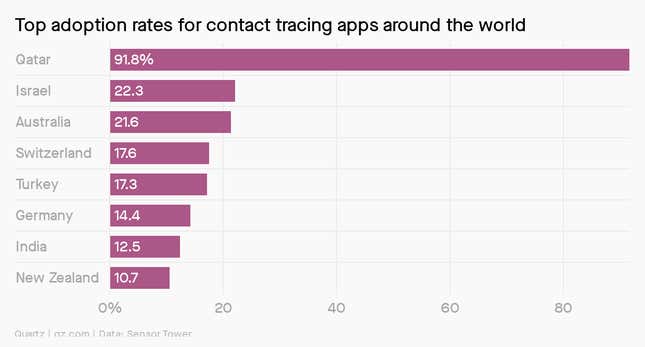Good morning, Quartz readers!
Here’s what you need to know
The US will put visa restrictions on Chinese tech workers. Secretary of state Mike Pompeo denounced Huawei and other companies for allegedly helping China commit human rights abuses. Meanwhile, China rebuked the UK for following the US’s lead on banning Huawei, and summoned the US ambassador over recent actions on Hong Kong.
The International Olympic Committee is still all in on Tokyo 2021. The IOC’s president said the organization is working on multiple scenarios for the Games to take place safely, even as Tokyo raised its coronavirus alert to “red,” the highest level. Meanwhile, Japan’s parliament debated whether to postpone $10 billion in tourism subsidies set to kick off this week amid fears travelers will spread the virus.
Google invested $4.5 billion in Jio Platforms. The cash will help Jio advance its 5G aspirations and follows other significant investments in Indian companies (✦ Quartz member exclusive) by Amazon, Facebook, and Google. The European Union also pledged stronger ties with India after a virtual summit with prime minister Narendra Modi.
Asian mobility companies advanced an electric future. Nissan introduced its first all-electric SUV, while Xiaomi debuted a second-generation electric scooter. New funding for Taiwan-based WeMo, an electric scooter sharing platform, will be used for international expansion.
Some good news on Covid-19 vaccines
You know we could all use some. Here’s the latest from around the world:
- Moderna said its test on 45 volunteers in March exceeded expectations; its final-stage trial with 30,000 participants will start July 27.
- India’s Zydus has started human studies, aiming to recruit 1,000 subjects.
- An initial trial of a new vaccine by Russia’s military had no complications or adverse reactions.
- The US Food and Drug Administration put a vaccine from Pfizer and BioNTech on the fast track for development and review.
- Oxford University and AstraZeneca, whose vaccine is already in phase 3 human tests, will publish what is rumored to be positive data on phase 1 on July 20.
Charting contact tracing
Over the past three months, about 50 national governments have released contact tracing apps to help warn their citizens if they’ve been exposed to someone infected with Covid-19. Data from mobile app analytics firm Sensor Tower suggests that, so far, most apps have not seen the download rates they need to effectively curtail the spread of coronavirus.
These are the eight countries with the most widespread usage, but check out the full chart to get the whole picture.

✦ For members: Transforming companies through literature
Ann Kowal Smith, founder and executive director of Books@Work, suggests discussing literature as a means of broaching conversations about race in the workplace. Research also suggests that reading literature may help increase empathy and understanding (pdf) of others’ experiences, potentially spurring better real-world behavior.
A few of the books and stories on race that Smith has found really resonate with workers:
📖 The Immortal Life of Henrietta Lacks, by Rebecca Skloot: “It’s an incredible story because it’s all about racial inequality and health disparities,” says Smith—a particularly timely topic given the disproportionate effect of Covid-19 on the US’s Black population.
📖 Kindred, by Octavia Butler: “It’s a fantastic novel about a Black woman married to a white man who lives in California in the 1970s, who has a series of dreams that transport her back to the plantation where her grandmother was born. It’s all about the legacy of slavery.”
📖 Homegoing, by Yaa Gyasi: This novel, which begins in 18th-century Ghana and goes on to cover eras from slavery to the Jazz Age, “is beautifully constructed and written, but also has this broad, sweeping story through the lens of multiple generations.”
Read Smith’s full list of recommendations here as part of our field guide on how to build an antiracist company. And of course, our recommended reading includes lots of Quartz content, which you can have full access to by snagging a membership. Try it for free for seven days.
We’re obsessed with the work week
Punching the clock. Why, ask modern observers of burnout and critics of our faltering wellbeing, are we still shackled to 40+ hours at a desk, clocking in doggedly, albeit digitally, each day, when many jobs don’t require it? Believe it or not, the work week as we know it was only created as a response to the industrial revolution’s labor excesses. Which isn’t to say we’re working the right amount. Stop whatever work you’re pretending to do, and let the Quartz Weekly Obsession be your boss for a while.
Surprising discoveries
A Burmese python would beat a grizzly bear in a hot dog eating contest. Humans land somewhere in the middle.
Coca-Cola confirmed a shortage of canned soda. It blamed scarce aluminum supplies and pandemic-induced panic buying.
Some Renaults are free in Germany right now. Generous electric-car subsidies cover the entire cost of a lease.
What does the world look like from a beetle’s-eye view? Researchers strapped tiny cameras to the insects’ backs to find out.
The world is going to have a lot fewer babies. A new study predicts fertility rates will drop in nearly every country by 2100.
Our best wishes for a productive day. Please send any news, comments, teeny camera knapsacks, and the number of hot dogs you think we can down within the time constraint of your choosing to hi@qz.com. Get the most out of Quartz by downloading our app on iOS and becoming a member. Today’s Daily Brief was brought to you by Nicolás Rivero, Jackie Bischof, Susan Howson, and Liz Webber.